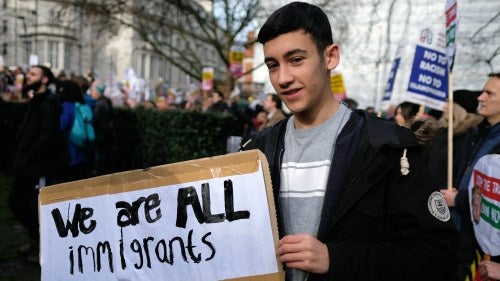The Midwest Can't Afford to Close Its Doors to Refugees

Midwestern governors have stopped accepting Syrian refugees in the wake of the Paris and Beirut terrorist attacks, though data shows they pose little risk.
Yesterday Governor Bruce Rauner added Illinois to a growing list of states—including Midwestern neighbors Indiana, Kansas, Michigan, Nebraska, Ohio, and Wisconsin—that have said they will temporarily stop accepting Syrian refugees in the wake of last week’s attacks in Paris and Beirut.
States can’t technically block approved refugees, but that point is moot in the big picture. Instead, the fear and rhetoric driving these state-level announcements raises larger, more important humanitarian issues, with significant implications for local economies and national security.
The threat of terrorism is real—the attacks in Paris have claimed an estimated 129 lives, with another 43 victims in Beirut.
But refugees aren’t the source of violence.
Instead, turning away refugees actually turns away would-be allies in the fight against terrorism, driving them back towards the very forces they are fleeing. It also compromises an important source of human capital in the economically and demographically stagnant Midwest, where cities like Chicago, Dayton, Detroit, Minneapolis, and St. Louis had previously called on President Obama to expand the cap on the number of Syrian refugees. Mayors of these cities—many the economic anchors of states now calling for bans—cited the “economic, social, and cultural” contributions of refugees. And it wasn’t long ago that Michigan Governor Rick Synder said he was considering welcoming more Syrian refugees to the state, calling it “part of being a good Michigander.”
The United States has long understood the importance of resettling refugees, and has a long history of successfully doing so, even in times of conflict. Over the past 30 years, our government has resettled some three million refugees, including 207,000 Vietnamese and 125,000 Cubans in 1980 alone. Since 2001, only two refugees have been accused of terrorist-related activities—incidents related to the war in Iraq that posed no immediate threat to the United States.
Most recently, the United States has safely opened its doors to Syrians. Since October 2011, we’ve taken in over 2,100 Syrian refugees without incident. Of these, just 94 have been resettled in Illinois, hardly justifying a block—even a temporary one—on resettling more.
Refugees are subject to the highest levels of scrutiny and background checks of any group admitted to the United States. In fact, the full vetting process—which includes health checks, biometric identity verification, biographical and background screenings, and in-person interviews—can take an average of two years to complete. Screenings are conducted via coordination amongst multiple security agencies, including the FBI, State Department, DHS, the National Counterterrorism Center, and the Department of Defense.
Also worth noting is that any refugee who has arrived in the United States for resettlement has been fully vetted by the United Nations in its own separate, detailed process.
Pre-Paris, public opinion reflected an understanding that refugees pose minimal threat to the United States. The 2014 Chicago Council Survey recorded a 20-year low in perceived threat from refugees and immigrants last spring, down 33 points from a high of 72 percent in 1994. (To be fair, the 2015 survey registered a slight uptick in concern, but overall levels remain low.)
Post-Paris, the challenge facing the Obama administration is to ensure that escalating anti-refugee rhetoric doesn’t compromise what is currently a safe and sound refugee resettlement system.
It also can’t let calls for a “temporary” stop to refugee resettlement devolve into a permanent block on this important source of humanitarian relief—and of human capital, especially in the Midwest.

